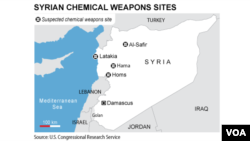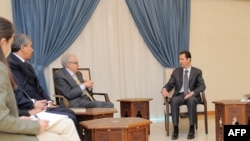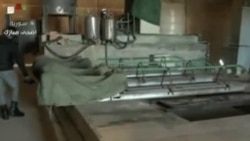The international watchdog overseeing Syria's destruction of its chemical weapons program says the country has met a deadline to destroy equipment used to make the arms.
Michael Luhan, spokesman for the the Organization for the Prohibition of Chemical Weapons, said the Assad government has cooperated with the internationally-imposed deadline.
“We consider that this first stage of verifying Syria's initial declaration of its chemical weapons program and verifying Syria's destruction of its production- making facilities in mixing and filling plants that that has all been achieved," Luhan said Thursday.
The Syrian government had until Friday to complete that step of an agreement that now calls for Syria to detail how it will destroy its chemical weapons stockpile by the middle of next year. That plan is due by November 15.
There were two sites inspectors deemed too risky to visit, said Luhan. The Syrian government, he said, gave them evidence that manufacturing equipment from those sites had been moved to another site inspectors had visited.
"Those sites were visited by our inspectors and relevant chemical weapons production equipment was functionally destroyed under our verification," Luhan said.
According to Luhan, the next step will be to destroy the chemicals and binary agents that are in Syria's existing weapons stockpile of around 1,000 tons.
“Our inspectors placed tamper-proof seals on all of these materials...They're under international control and can't be tampered with without us knowing immediately.”
Refugees
Also Thursday, rights group Amnesty International issued a report calling on Syria's neighbors, particularly Jordan, to ensure that refugees can freely enter those countries and not be forcibly sent back to Syria.
The group highlighted efforts surrounding countries have made to accommodate the more than two million people forced to flee the fighting Syria and the immense strain that has created on providing services. But Amnesty says Jordan is placing "undue restrictions" on who can enter the country.
The report calls on the international community to provide financial aid and technical support to nations hosting Syrian refugees, and to offer increased opportunities for refugees to resettle abroad.
UN envoy visit
Meanwhile, U.N.-Arab league envoy Lakhdar Brahimi is continuing his visit to Syria with meetings Thursday and Friday with opposition and women's groups. He will then travel to Lebanon for talks with officials there as he tries to build support for the so-called "Geneva 2" peace talks.
Syrian President Bashar al-Assad warned him Wednesday after the two met in Damascus that the proposed peace conference can only succeed if other countries end their support for rebel groups.
Brahimi is due to meet with U.S. and Russian officials in Geneva next week to discuss where preparations for the talks stand.
The United States and Russia have been pushing for those talks to take place in November. Syria's rebels and opposition groups have yet to commit to any talks, rejecting any process that does not remove Assad from power.
Related story on U.S. reaction by Michael Bowman:
Obstacles
American University International Relations Professor Robert Pastor says such distrust is just one of the many issues diplomats will have to overcome for peace talks to have any chance.
"The most important is how do you get all the key parties to the table? What preconditions do you set or what preconditions do you eliminate? If you have one precondition that Assad cannot either participate in any form nor can his government nor can he participate in an electoral process then this is a recipe for failure," Pastor said.
Pastor said in an interview the United States will likely also have to find ways to make any "Geneva 2" talks more inclusive.
"You have to find a way to get Assad there. You have to find space for both the Russians and the Iranians to feel they have a place at the table and they have a stake in the process and the outcome," he said.
More than 100,000 people have been killed in Syria since March 2011 while millions more have been forced to flee their homes.
Edward Yernanian contributed to this report from Cairo.
Michael Luhan, spokesman for the the Organization for the Prohibition of Chemical Weapons, said the Assad government has cooperated with the internationally-imposed deadline.
“We consider that this first stage of verifying Syria's initial declaration of its chemical weapons program and verifying Syria's destruction of its production- making facilities in mixing and filling plants that that has all been achieved," Luhan said Thursday.
The Syrian government had until Friday to complete that step of an agreement that now calls for Syria to detail how it will destroy its chemical weapons stockpile by the middle of next year. That plan is due by November 15.
There were two sites inspectors deemed too risky to visit, said Luhan. The Syrian government, he said, gave them evidence that manufacturing equipment from those sites had been moved to another site inspectors had visited.
"Those sites were visited by our inspectors and relevant chemical weapons production equipment was functionally destroyed under our verification," Luhan said.
According to Luhan, the next step will be to destroy the chemicals and binary agents that are in Syria's existing weapons stockpile of around 1,000 tons.
“Our inspectors placed tamper-proof seals on all of these materials...They're under international control and can't be tampered with without us knowing immediately.”
Refugees
Also Thursday, rights group Amnesty International issued a report calling on Syria's neighbors, particularly Jordan, to ensure that refugees can freely enter those countries and not be forcibly sent back to Syria.
The group highlighted efforts surrounding countries have made to accommodate the more than two million people forced to flee the fighting Syria and the immense strain that has created on providing services. But Amnesty says Jordan is placing "undue restrictions" on who can enter the country.
The report calls on the international community to provide financial aid and technical support to nations hosting Syrian refugees, and to offer increased opportunities for refugees to resettle abroad.
UN envoy visit
Meanwhile, U.N.-Arab league envoy Lakhdar Brahimi is continuing his visit to Syria with meetings Thursday and Friday with opposition and women's groups. He will then travel to Lebanon for talks with officials there as he tries to build support for the so-called "Geneva 2" peace talks.
Syrian President Bashar al-Assad warned him Wednesday after the two met in Damascus that the proposed peace conference can only succeed if other countries end their support for rebel groups.
Brahimi is due to meet with U.S. and Russian officials in Geneva next week to discuss where preparations for the talks stand.
The United States and Russia have been pushing for those talks to take place in November. Syria's rebels and opposition groups have yet to commit to any talks, rejecting any process that does not remove Assad from power.
Related story on U.S. reaction by Michael Bowman:
Obstacles
American University International Relations Professor Robert Pastor says such distrust is just one of the many issues diplomats will have to overcome for peace talks to have any chance.
"The most important is how do you get all the key parties to the table? What preconditions do you set or what preconditions do you eliminate? If you have one precondition that Assad cannot either participate in any form nor can his government nor can he participate in an electoral process then this is a recipe for failure," Pastor said.
Pastor said in an interview the United States will likely also have to find ways to make any "Geneva 2" talks more inclusive.
"You have to find a way to get Assad there. You have to find space for both the Russians and the Iranians to feel they have a place at the table and they have a stake in the process and the outcome," he said.
More than 100,000 people have been killed in Syria since March 2011 while millions more have been forced to flee their homes.
Edward Yernanian contributed to this report from Cairo.









